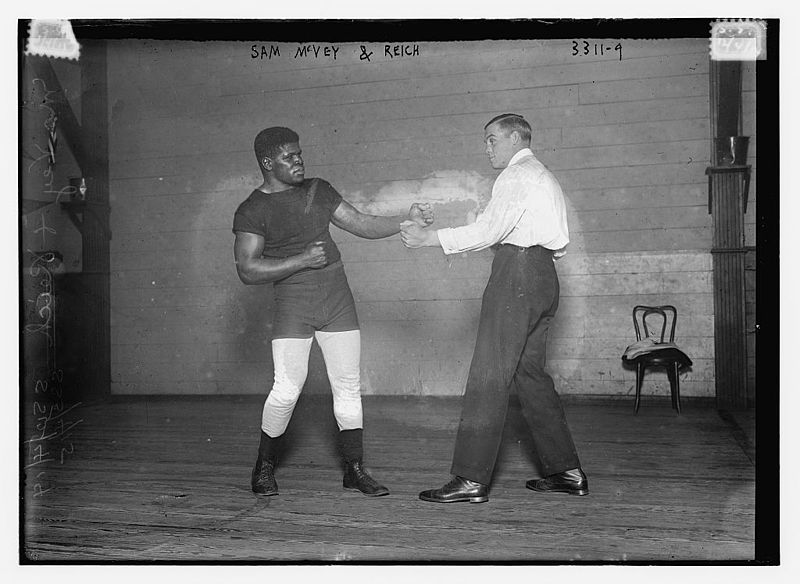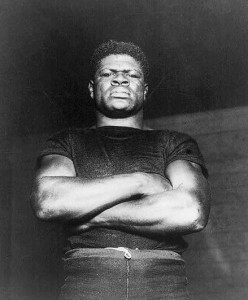McVea KOs Matsuda
In mixed style bouts between wrestlers and strikers, the adage is once the wrestler gets his hands on the striker, the fight is over. In most mixed style bouts between wrestlers or grapplers and boxers, the grappler normally wins after dragging the striker to the ground.
Ray Steele defeated Battling Levinsky. “Judo” Gene LeBell smashed Milo Savage. In modern times, Randy Couture defeated James “Lights Out” Toney.

Sam McVey and Al Reich in 1914 (Public Domain)
However, all fights start on their feet. Nate Marquardt knocked out Damian Maia within twenty seconds of the first round of their fight. Sam McVea pulled off a similar feat on New Year’s Eve 1908 in Paris, France.
McVea was one of the greatest boxers of the early 20th century. However, Sam McVea was African American, which prevented McVea from boxing for the World Heavyweight Boxing Championship. Boxing promoters forced McVea to fight other great Black boxers.

Sam McVey circa 1914 from the Public Domain
Tired of the discrimination in the United States, McVea fought in France, where American performers like Josephine Baker found the French public treated African Americans better the American public. While McVea boxed in France, McVea accepted a mixed styles fight with a jiu jitsu fighter named Tano Matsuda.
Promoters billed Matsuda as the undefeated Japanese jiu jitsu champion. However, Matsuda was an English jiu jitsu student of Mitsuyo Maeda, Yuki Tano, or Taro Miyake. Matsuda had only trained in jiu jitsu for a couple of years. Matsuda should have studied longer.
McVea entered the ring with boxing gloves on. Matsuda wore a traditional jiu jitsu gi. At the opening bell, McVea unleashed a left hook that deposited Matsuda on the mat in a heap.
The rules allowed McVea to strike on the ground, so McVea punched Matsuda, who was lying on the ground in the fetal position. The referee stopped the bout before McVea could do any more damage to the helpless Matsuda.
The fans booed the promoters for booking an obvious mismatch between a world class boxer and amateur jiu jitsu fighter. The fans did not take it out on McVea, fortunately.
McVea continued fighting in France before traveling to Australia in 1911, where McVea boxed for three years. McVea returned to the United States in 1914.
McVea died at the tragically young age of thirty-seven years old on December 23, 1921 after a bad case of pneumonia.
You can leave a comment or ask a question about this or any post on my Facebook page or Twitter profile.
Pin It
